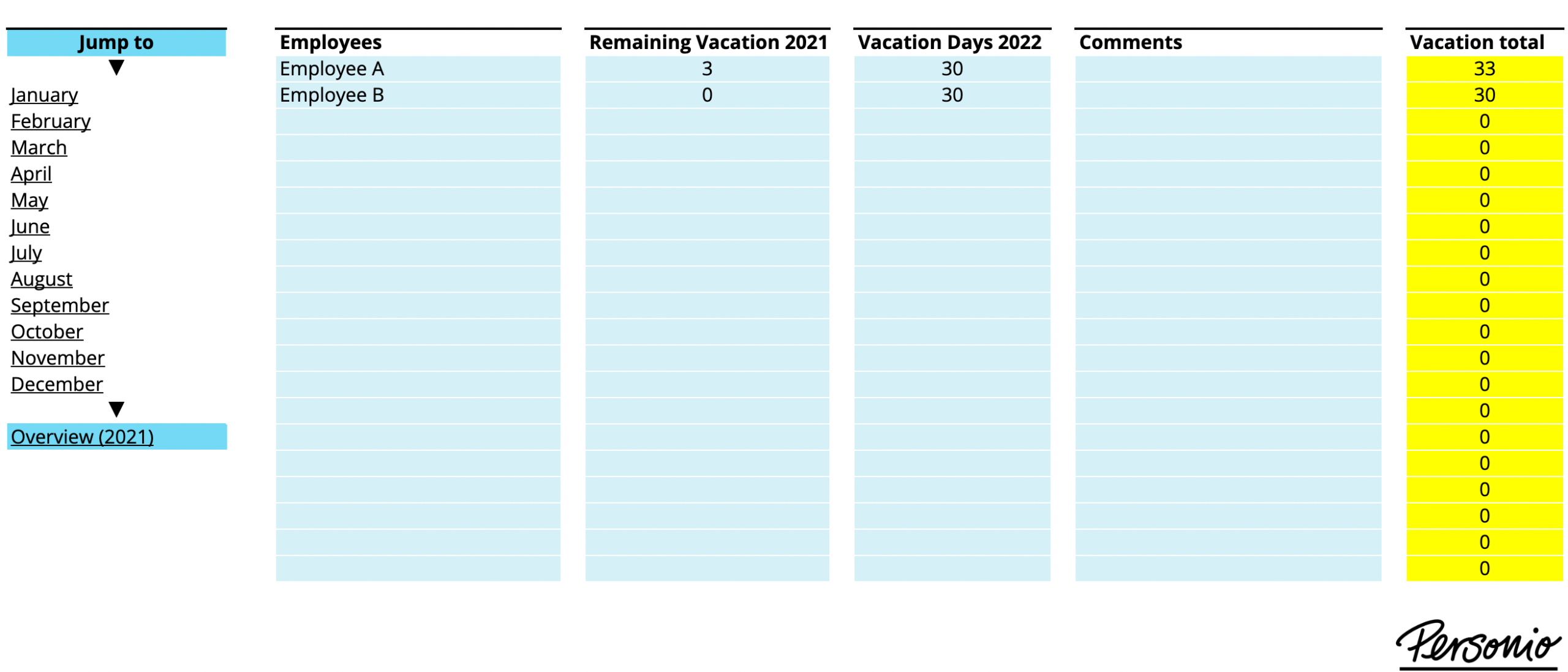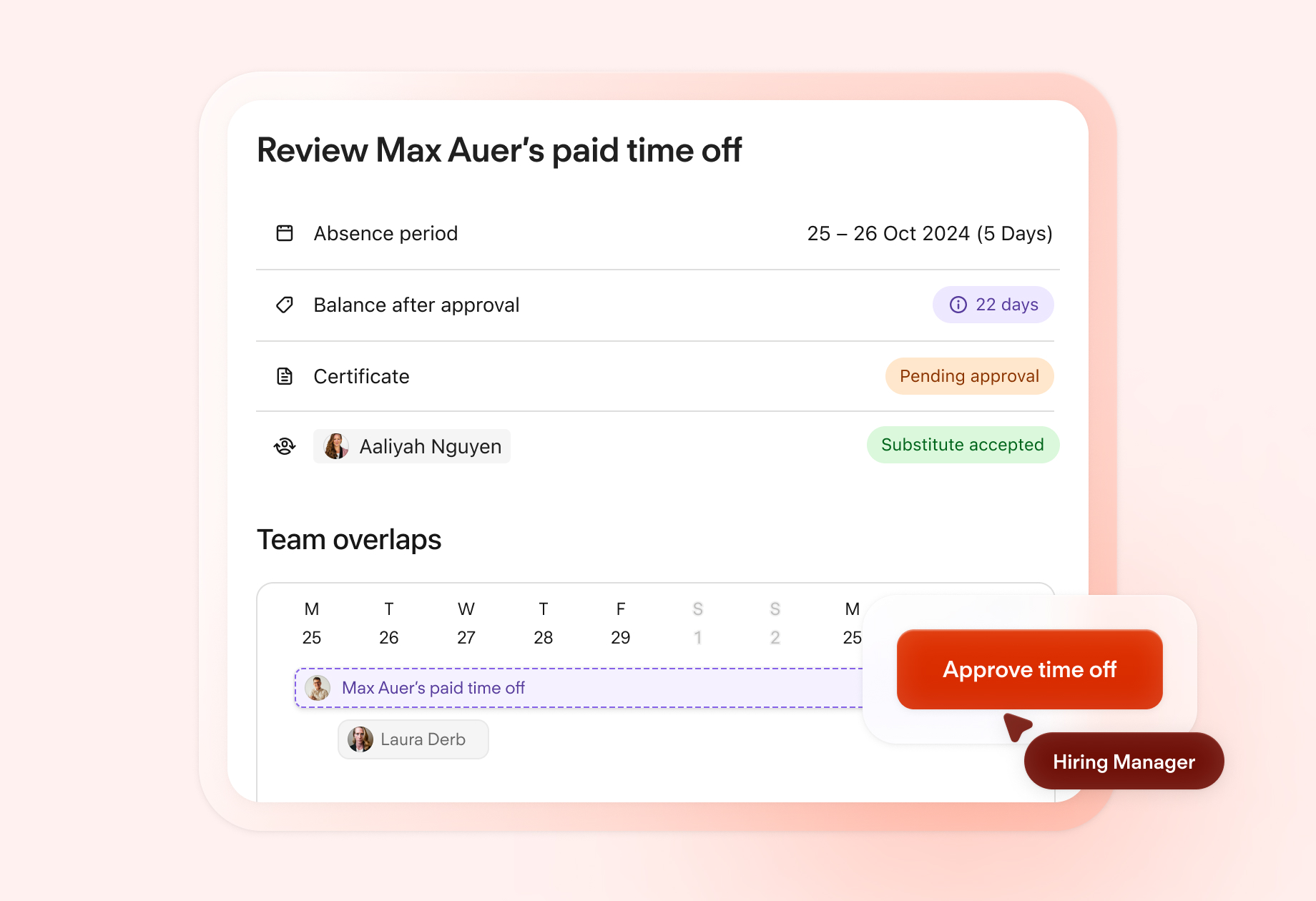Key Considerations for Stress Leave From Work

How common is stress leave from work? In 2020 alone, statista found that 79% of respondents in the UK experienced work stress frequently. That’s a lot of potential employees who may become so stressed, they simply can’t sign in to work.
In this article, we dive into what it means to be signed off work with stress, signs and symptoms to watch out for and even how HR can support employees in stressful times.
Track holidays without the headache of paperwork. Discover Personio today.
Contents
What is Stress Leave From Work?
Stress leave from work is time off when employees are overwhelmed or stressed and unable to do their job. Time off with stress may be taken to recover from stress-related injuries or illnesses. These can include both physical or emotional symptoms.
When an employee is signed off work with stress, taking time off is only the beginning of the journey. If the underlying issues causing the stress are not addressed, an employee is likely to return with a bit more perspective or energy, but succumb to symptoms again in time.
That’s why understanding stress leave from work requires sensitivity, investigation and creative thinking, to avoid it becoming a recurring event.
How Long Can Employees Be Signed Off With Stress?
In the UK, an employee can take sick leave for up to 7 days in a row – regardless of why they are stressed – without a note from their doctor unless your sickness policy states otherwise.
However, as soon as they have been sick for 7 days (including weekends or bank holidays) they need a fit note from their doctor.
Employees can be signed off work for stress and receive Statutory Sick Pay (SSP) for up to 28 weeks. However, they have to be earning at least £118 per week and have worked for your company. Employees are entitled to £99.35 Statutory Sick Pay (SSP) per week for up to 28 weeks.
What Qualifies for Stress Leave From Work in the UK?
With CIPHR reporting that one in 14 UK adults feeling stressed every day and 20% feeling stressed more days at work than not, HR leaders are having to deal with more requests or requirements for employees to take stress leave from work.
If an employee is unable to work, the underlying cause of the stress is largely irrelevant. In the UK, employers have a duty of care to their employees (a moral or legal obligation to ensure their safety or well-being).
This means that companies need to support an employee when they’re off sick, regardless of the cause.
At a Glance: Easily Manage Absences Across Your Org

Make absence planning and tracking a pleasure, and not a pain, with Personio.
Track absences with PersonioWhat Are the Signs and Symptoms of Work-Related Stress?
When are employees sick, and when are they stressed? While it’s easy to dismiss a sore throat and a cough as a cold or COVID, repeated bouts of illness may be an indicator that your employee is stressed and may benefit from taking stress leave from work.
Common signs of work-related stress include:
Being sick often
Being late or absent regularly
Having regular or lingering colds
Getting indigestion
Headaches or backaches
Weight gain or loss
Shortness of breath or fatigue
Insomnia
Excessive consumption of caffeine or alcohol
Emotion-related signs of stress may also include feeling down or depressed, apathetic, irritable, angry, cynical or defensive.
When employees are being less productive than usual or have difficulty concentrating this may also be a sign that they need to take time off with stress.
Managing Stress Leave From Work Through Employee Wellbeing
Ultimately, HR’s goal is to help employees work well and be at their best. Employee wellbeing programmes aren’t just about letting employees take enough time off work so they can come back feeling better. They go beyond physical wellness to include spiritual, emotional, social, intellectual, environmental and occupational wellness.
HR can take steps to recognise and reduce work-related stress including:
Setting up a time to listen to employees when they’re stressed, without judgement.
Giving employees opportunities to provide feedback – including performance development reviews, employee engagement surveys and listening tools like pulse surveys.
Working with managers to help them reduce workloads, reallocate tasks, change working hours or consider alternative or less demanding roles.
Creating or referring employees to relevant employee wellbeing programmes.
Helping employees access Employee Assistance Programmes, if you have them.
Offering training on mental health in the workplace.
Giving employees enough leave (and, if necessary, requiring them to take the leave!).
Making employees aware of their sickness-related rights including Statutory Sick Pay and Long-Term Sick Pay
Offer meaningful fringe benefits.
Unfortunately, work-related stress is occasionally so severe that employees have no alternative but to take time off with stress. When this happens, they should consult their doctor, get a doctor’s note or fit note for stress leave, tell their employer, focus on their recovery and be clear about what they need to get help at work.
Helping HR Stay on Top of Time Off With Stress
A comprehensive HRIS can help ensure that you’re tracking absences across your organisation. That includes holidays, sick leave and even stress leave. Personio’s Absence Management platform is an all-in-one solution for requesting, tracking and reporting on absences.
Get time back to focus on stress leave, and alleviating it in your organisation. That can only be done when you have the administrative work sorted. Book a demo today to speak with an expert about turning paperwork into people work.

